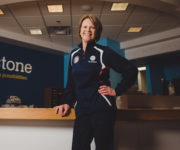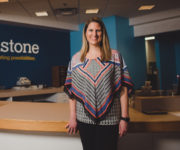Meet the Match
Fiji's Paralympic President Dreams Big for His Country
On the islands of Fiji, where ancient warriors evolved into some of the world’s most talented and formidable rugby players, the values of strength and toughness are highly valued.
Growing up in the town of Nausori, those values were the same for Fred Fatiaki. The oldest of five boys, he loved playing touch rugby with his bigger, stronger brothers—one of whom went on to play professionally for the national team. Throughout his early life, he was embraced by a family that pushed him to succeed, while showering him with love and support. He carried the responsibility of “leading by example” as a badge of honor.
Born with cerebral palsy, Fred was not treated differently from anyone else until he was 8 years old. After three years at a special school he attended for children with disabilities, he transferred to a mainstream all-boys school. On the first day of classes, the students stared him up and down, murmuring about what the boy who walked funny was doing mixed in with everyone else.
“I was like someone who had fallen out of the sky,” Fred laughs. “My mom told me, ‘They’re only staring at you because you’re special, Freddy.’ Disability awareness was still very low in those days. But, it taught me how to be strong—it made me who I am.”
When Fred was in secondary school, the girls joked about whether he would ever get married, and his skin grew thicker. He became increasingly focused on excelling. “A leader always has the courage to move forward,” he told himself. Sport still hadn’t made an appearance in his life, but it was there in his bloodline, inherited from grandfathers who were national rugby and cricket players.
At the age of 17, Fred traveled to Hawaii to undergo surgery for his mobility. After he returned and completed rehabilitation, he joined the Fiji Sports Association for the Disabled, where he began to lay the groundwork for his new calling in sports.
After one year of training, he won a gold medal in table tennis at the Fiji Games—the first of many in his career. He then transitioned into athletics and in 2002 won his first international silver medal in the 200 meters at the Far East and South Pacific Games for the Disabled (the predecessor to the Asian Para Games).
After retiring in 2005, Fred became one of the first coaches in Fiji with a visible disability. Over the years, he has coached many of the country’s top athletes, including Iliesa Delana, who won the gold medal in the men’s high jump at the 2012 London Games— the first Fijian to win a Paralympic medal. It was a moment of intense satisfaction for Fred, as the “boy with the funny walk” made history for his country.
“We prepared for six years for that moment,” Fred says. “I’m humbled that out Fiji’s best coaches in different sports, I had the honor of being the first to bring a medal home. It completely opened the door for sports and disability in our country, and showed that people like me can contribute.”
Despite growing awareness and support, the Paralympic movement has progressed slowly in Fiji. Currently, the Fiji Paralympic Committee supports only eight athletes, all in table tennis and track and field events. For seven years, Fred volunteered as a sports development officer for the committee before being named its president. On top of this distinguished role, Fred continues to coach Fiji’s top track and field athletes.
According to the Asia-Pacific Development Center on Disability, of Fiji’s population has a type of disability. In order to reach more people through adaptive sports, the committee organizes sports programs at 17 specialized schools, where more than 300 students with a range of physical and intellectual disabilities are positively impacted.
“I see so many people with disabilities who are not given the opportunity to show what they can do in sports,” Fred says. “People focus more on the disability than the ability. Sport is a way to challenge that view and open minds.”
As a participant in the U.S. Department of State Global Sports Mentoring Program, Fred worked closely with Turnstone mentors Tina Acosta, director of program outreach, and Michelle Kimpel, director of wellness and adaptive sports, to create a strategy for expanding the Paralympic movement in Fiji. A Gold Level Paralympic Sports Club, Turnstone is home to the U.S. Men’s Paralympic Goalball Team, and offers eight competitive and recreational sports, including wheelchair rugby, wheelchair basketball, and power soccer. In 2015, the organization raised $15 million from the surrounding community to open its state-of-the-art sports facility, which serves more than 2,200 people annually with sports, rehabilitation, adult learning, and inclusion programs. Working alongside two of Turnstone’s most experienced leaders, Fred learned about fundraising, community engagement, and new program monitoring practices that can help ensure the committee’s long-term sustainability, and show how sport can make an even deeper impact in the lives of people with disabilities across Fiji.


